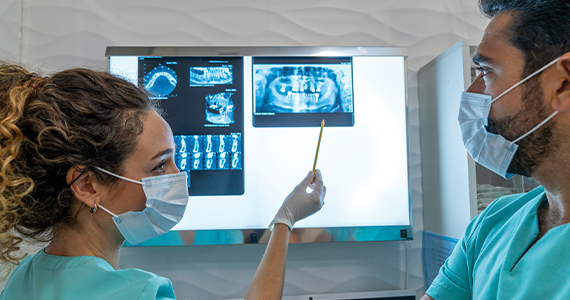Dental Specialists: A Breakdown
An inside look at different dental specialties.

What Makes a Dental Specialist Special?
Dental specialists become dentists the same way general dentists do. They complete a 4-year undergraduate (bachelor) degree, pass the Dental Admission Test and successfully earn a dental degree to become licensed to practice as a dentist. Specialists, however, spend at least an extra two years pursuing postgraduate training in their chosen specialty before becoming board-certified as a specialist.
What Type of Specialists Might I Need?
It is not uncommon for a person to visit at least one type of specialist in their lifetime. The type of specialist you might see will depend entirely on what treatment may be needed. The most common dental specialists include:
Pedodontist
- A pedodontist, or pediatric dentist, specializes in working with infants and children through adolescence. They also offer treatment for people with special needs.
- When children reach adolescence, they are typically referred to a family or general dentist for their care.
- Pedodontists perform routine services, like exams, cleanings, crowns and fillings. They may also perform more specialty services, like root canals or pulpotomies (removal of tooth pulp) on primary teeth. In contrast, other specialists might only perform these specialty services on permanent teeth.
- Some very young or special needs patients might not be able to sit still for dental treatment. Many pedodontists provide sedation services or have hospital privileges so they may provide dental treatment in a hospital, under anesthesia.
Orthodontist
- Orthodontists are specialists who focus on tooth alignment and your bite. They are trained in understanding growth and development of dental, neuromuscular and skeletal defects of the orofacial structures. As a result, the specialty is formally called orthodontics and dentofacial orthopedics.
- A general dentist might refer a person with an overbite, underbite, cross bite or misaligned teeth to an orthodontist.
- Treatment may consist of braces, retainers, aligners or headgear.
Oral and Maxillofacial Surgeon
- General dentists often perform some simple surgical procedures, like extractions, but people are referred to oral and maxillofacial surgeons when more complex surgical procedures or sedation is needed.
- This type of specialist performs dental surgery, like wisdom tooth removal, along with implant and medical procedures, like cleft lip/palate, or those who need corrective surgery due to an injury to the jaws or facial bones.
- Most oral and maxillofacial surgeons are licensed to provide all levels of sedation, from laughing gas to general anesthesia.
Endodontist
- Endodontists specialize in treating conditions related to tooth pulp, where the tooth's nerve and blood vessels are located.
- One treatment option for an abscessed, severely decayed or broken/cracked tooth would be to have the tooth pulled, but it's not always ideal. Instead, a person may be referred to an endodontist to perform a root canal to try to save the tooth structure.
- Once a root canal is completed, the endodontist will likely refer you back to your general dentist for a permanent restoration, like a crown.
- Most endodontists will only perform advanced procedures, like root canals, on permanent teeth. If your child has a primary tooth that requires endodontic treatment, they may need a referral to a pediatric dentist.
Periodontist
- Periodontists specialize in the prevention, diagnosis and treatment of gum disease and other tissues that support the teeth.
- You may be referred to a periodontist if you have been diagnosed with periodontitis (gum disease).
- Some treatments a periodontist might perform are surgical, including gum grafts or periodontal pocket reduction procedures.
- Periodontists also frequently provide dental implants.
Prosthodontist
- Prosthodontists specialize in designing and creating replacements for teeth and other parts of the mouth. This may include providing services, like dentures, bridges and partials, as well as reconstructive prosthetics.
- Many, but not all, general dental offices provide partial and denture services at their clinics; however, they may refer a person to a prosthodontist in some instances.
- General dentists might also refer a person with a unique or absent jawbone structure, allergies to certain materials or other medical conditions to a prosthodontist in order to best accommodate their needs.
Specialists and Dental Coverage
Dental treatment provided by a specialist can be costly. To avoid surprise costs, it is very important that you confirm that the specialist you plan to see is in network and that the treatment planned is covered under your dental plan benefits. Blue Cross Blue Shield FEP Dental strongly recommends, and highly encourages, that pre-treatment estimates be submitted for all major and extensive services prior to treatment.
Why Would I Need a Specialist?
General dentists are able to perform most dental procedures. However, there are some occasions where a procedure might be more complicated or when special tools or equipment may be needed. In these cases, your general dentist may refer you to a specialist for specialized care or for a second opinion.
Many dental clinics have dental specialists on their staff, but sometimes your general dentist may refer you to a dental specialist at a different office. If your dentist feels a dental specialist is needed, they should provide you with a referral, identifying the type of specialist and treatment needed.
Note: The information in this document is not meant to replace the advice of your dentist or another licensed healthcare professional. Talk to your dentist for any specific dental advice.






